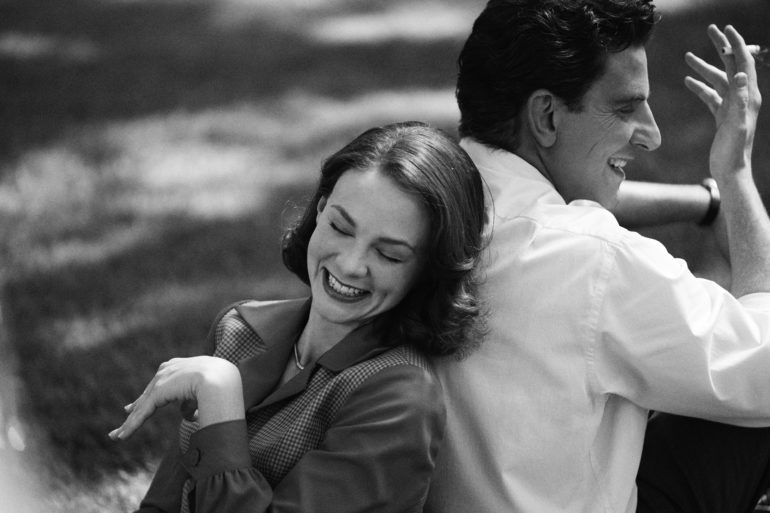It takes creativity to talk about creativity. Leonard Bernstein was one of the most consistent and engaging creatives of the 20th century. As composer and conductor, his influence continues to inspire, and not just in the world of music. Maestro was a longtime project on Steven Spielberg’s roster but, while remaining a producer on the final film, he opted to hand over the reins of the film to Bradley Cooper. The success of his remake of A Star Is Born was due in no small part to his effortless but considerate direction. Those two adjectives make Cooper an ideal candidate to tell the story of a man who made everything look effortless, including living a most complicated life.
Maestro enters an already-crowded field of biopics this year, and its bow at the Venice Film Festival follows on the heels of Ferrari’s debut. Recent retellings of the lives of troubled thoughtful men have examined the line between their being victims of circumstance, and victims of their own success (Oppenheimer’s dissection of this phenomenon was particularly dizzying). Aws with these other remarkable men, Bernstein was charismatic, handsome, preternaturally talented, and achieved considerable success while still relatively young. Cooper and Josh Singer’s script take Bernstein’s talent as a given. In his performance, Cooper emphasizes the fast-spoken and quick-witted charm of the man, seducing audiences and lovers alike. While covering a large portion of Bernstein’s life, Maestro wisely keeps its focus on his loves, in particular the relationship between Bernstein and the woman who would become his wife, Felicia Montealegre.
Carey Mulligan takes top billing as Felicia. Despite Leonard being the title character, the name Maestro refers to his dominant position in a relationship and marriage that, while loving and convenient, was more to his advantage than hers. When we see the pair meet for the first time, and exchange handy exposition in flirty badinage, Felicia’s star is on the rise as a stage actress, culminating in this understudy taking a brief lead on Broadway. The first half of Maestro, the exciting honeymoon period, is shot in a luscious, smoky black and white by DoP Matthew Libatique (Black Swan, Iron Man). Like Oppenheimer, the colour scheme lets us know the real story, albeit in reverse. Secrets lie in the shadows, while the colour of the second half brings them out for all to see. Like many a muse, Felicia gets unintentionally sidelined, while her husband inhabits the spotlight and enjoys the perks that come with it. For 25 years, Felicia and Leonard maintained a marriage (including three children) while Bernstein had numerous affairs with both men and women. Cooper may have the showier part as the flamboyant Leonard (with the fake nose as the icing on the cake), but Mulligan is his equal in a trickier role. The couple’s early days are a swoon, but as time goes on, attitudes and behaviours change. Mulligan’s elegant accent and bright smile encourage us to laugh with her as Felicia falls in love, but the same face hardens with scarcely a blink as Leonard takes advantage of his fame and his admirers. Mulligan maintains a fierce interiority while bringing her natural charm to deflect the sins of her onscreen husband. She’s masterful.
Lest this all sound like a standard biopic structure (and it is), the uber-talented Cooper is determined to bring some imagination to the formula. Wildly elaborate camera moves and large stage-bound sets evoke the musicals Bernstein scored. One flight of fancy sees Leonard charm Felicia in the style of ‘New York, New York’ from On The Town. A late show-stopping setpiece sees Cooper recreate Bernstein leading the ‘Resurrection’ from Mahler’s Symphony no. 2 at Ely Cathedral in 1974. This sequence not only shows both Bernstein and Cooper to be passionate craftsmen, but goes so far as to illustrate the importance of a conductor to an orchestra. This has the potential to make devotees of philistines. Even among such visual exuberance, Cooper knows when to slow down, and he trusts his cast enough to let whole conversations take place in long takes. Maestro takes a leaf from the book of the greatest of subversive biopics, Amadeus, by letting the subject’s work be the score for the film. A new generation of Bernstein fans will be made in repeat listens of the soundtrack.
Maestro doesn’t reinvent the true story wheel, but it shows what the genre can do when the subject is treated with care. The film never indulges in tawdry speculation or pathologisation, but instead reminds us that human beings lie behind famous names. When the film opens with a quote from Bernstein himself (“A work of art does not answer questions, it provokes them”), it lets you know that it’s the audience’s task to make their own judgement. As an impetus for doing so, Maestro gives you a joyous, honest and tremendously crafted drama. That’s music to our ears.

